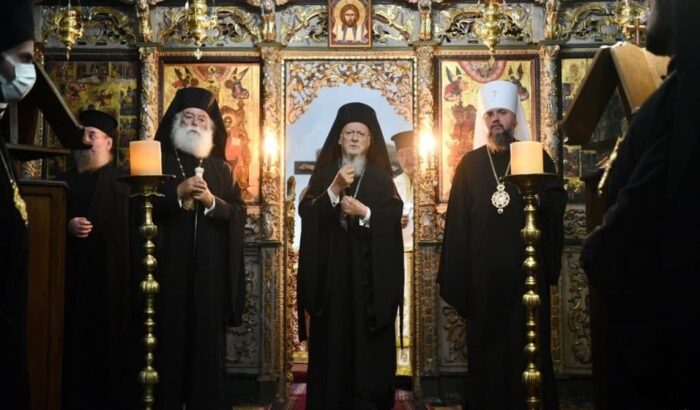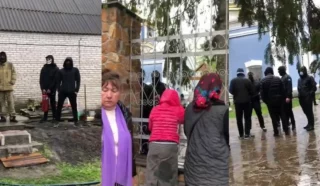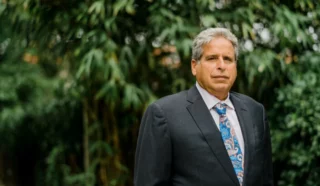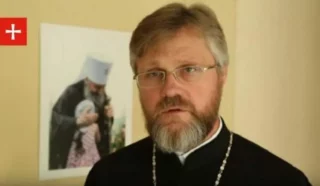The victorious march of the “gratitude procedure” in relation to the Ukrainian church schism has slowed down significantly. Despite the loud statements of the head of the “OCU” that in the near future his organization will be recognized in another two or three Local Churches, it is not the first time that they sound, but they never get to the point.
This situation indicates that among the Local Churches there is no unequivocal attitude towards the “Orthodox Church of Ukraine” artificially created by the Patriarch of Constantinople. From an ecclesiastical canonical point of view, the main obstacle in this matter is the absence of canonically perfect and recognized ordinations among a significant part of the clergy of the Ukrainian schism.
Few are ready to simply accept for granted the decision of Patriarch Bartholomew to legalize the canonical powers of the OCU episcopate. This is not surprising, because how can you legalize something that did not exist. A lot of research materials have been written on the topic of “ordinations” in the Ukrainian schism, and, which is typical, not only among the Russian Church, but also by well-known theologians from all over the Orthodox world.
In fact, the scientific church environment has already given an answer to the question of recognizing the OCU. Everyone agrees that it is the canonical ordinations that can become the main step that could simplify the issue of their legalization in the church environment. However, as can be understood from the statements of the schismatics, they will not agree to this. Thus, the majority of Orthodox Churches have made a decision to observe the canonical order. However, this issue is viewed from a completely different angle when church politics is involved. It is she, unfortunately, that now prevails over canon law, shaping a completely different agenda among the Local Orthodox Churches.
Churches of the “Slavic Region”
A united front against the OCU was made by the Local Churches of the so-called Slavic basin. These include the Russian, Serbian, Polish and Czech lands and Slovakia. There is no talk of the Russian Church at all, since the creation of the OCU is basically a deliberate attack on Russian Orthodoxy. At the same time, at different times, from the day the notorious Tomos was given, interesting processes were observed in Poland, Serbia and Czechoslovakia (the two states were united not on a territorial, but on a church basis, – ed.).
At first, after the triumph of Ukrainian schismatics, these Churches unequivocally spoke about the impossibility of recognizing this structure, but they were extremely cautious about what kind of characterization to give the role of Patriarch Bartholomew in this matter. Subsequently, only the Serbian Church called the actions of the head of the Phanar in Ukraine “non-canonical”. The Polish Orthodox Church did not condemn Patriarch Bartholomew, but categorically refused any communication with the “OCU”. It is interesting that the Church of the Czech Lands and Slovakia did not express a conciliar decision on the Ukrainian schism, limiting itself to private statements by the Primate and individual representatives of the episcopate. The Synod of this Church decided to refrain from assessing this situation until the issue is resolved at the pan-Orthodox level.
For the sake of justice, it should be noted that even among the episcopate of the OChZS there were those who hastened to publicly recognize the OCU. So, on November 20, 2019, Bishop Isaiah (Slaninka) of Sumperk took part in a “divine service” at the St. Michael’s Cathedral of the OCU in Kiev. Upon learning of this situation, the Primate of the Orthodox Church of the Czech Lands and Slovakia condemned the actions of Bishop Isaiah, threatening, in case of its repetition, with the sanctions of the Synod.
Be that as it may, the period of turbulence in the environment of these Churches has passed. Despite the fact that each of the Primates was visited several times by the US Special Representative on Freedom of Religion, the Slavic Churches remained adamant, repeatedly expressing their support for the Ukrainian Orthodox Church and its head, Metropolitan of Kiev and All Ukraine Onufriy. Their position was confirmed this year, when representatives of these Churches took part in the celebrations timed to coincide with the next anniversary of the Baptism of Rus.
“Balkan” Churches
The Albanian and Bulgarian Orthodox Churches immediately after the creation of the “OCU” were as restrained as possible in their assessments, both in relation to the actions of Patriarch Bartholomew and to the church situation in Ukraine. The reason for this is the serious influence of the Patriarchate of Constantinople on these geographical territories, which at different times were subordinate to it. The Primate of the Albanian Church, Archbishop Anastassy, in general erupted in criticism of Patriarchs Bartholomew and Cyril, accusing the former of unilateral actions in Ukraine, and the latter of unwillingness to make concessions regarding the Ukrainian church issue. Nevertheless, the Albanian Church declared that the Ukrainian schismatics were deprived of grace, and the church crisis in Ukraine could be resolved only at a Pan-Orthodox meeting.
After that, no further statements were made by the Albanian Church on this topic. Unless, it is worth recalling the refutation by the representative of Archbishop Anastasy of Dumenko’s statement that the OCU will soon be recognized by the Albanian Church. This statement was published at the beginning of 2021 and, according to the assurance of the Albanian side, nothing has changed in the position of the Primate and Synod of the AOC.
The news about the next meeting of the Synod of the Bulgarian Church is greeted with aspiration in Ukraine. Since 2019, this Local Church has not expressed its attitude to the “OCU” and the Ukrainian church crisis. At the same time, it is worth noting that a very significant coalition has formed among the BOC episcopate that supports the canonical UOC. At least this group has no public opponents in Bulgaria.
The latest public statements by representatives of the Bulgarian Orthodox Church regarding the Ukrainian schism were made in early 2021 and were provoked by the above-mentioned statement by the head of the OCU about the “imminent recognition” of its structure by a number of Local Churches, in the list of which he also included the BOC. Metropolitan Gabriel of Lovchansk said the following: “The Holy Synod of the BOC has appointed an episcopal commission for a detailed study of the issue related to the schism in Ukraine and the presentation of a corresponding report at meetings of the Synod of the Bulgarian Church. There hasn’t been such a report yet. ” In his commentary, Metropolitan Gabriel also once again confirmed his Orthodox position regarding the Ukrainian schism: “I, as a bishop and metropolitan of the BOC, categorically declare that there is only one sacred canonical Church in Ukraine. And this is the Ukrainian Orthodox Church, headed by His Beatitude Metropolitan Onufriy. ”
Thus, the position of the “Balkan” Churches is more in favor of the UOC than the “OCU”. The Albanians, obviously, withdrew themselves from resolving this issue, shifting all responsibility to the perpetrators of its occurrence. At the same time, in the AOC, even taking into account the existing crisis in Orthodoxy, they declared their support for the Patriarch of Constantinople in this situation. Bulgarians are also not against Patriarch Bartholomew, but not for the recognition of the “OCU”. It seems that prominent representatives of the episcopate of this Church, who spoke in support of the UOC, will not give an opportunity to somehow develop this situation in favor of the Ukrainian schismatics.
Romanian-Georgian “powder keg”
The position of the representatives of the Romanian and Georgian Churches on this issue can be called neither cold nor hot. It cannot be said that these Churches are strongly dependent on some external factors; on the contrary, they are completely self-sufficient, both within their countries and in the external arena. However, the attitude of the Romanian and Georgian Patriarchates to the Ukrainian church issue depends on many factors.
If we take the Romanian Church, for example, it is no secret to anyone that due to its territorial proximity to Ukraine, it has corresponding claims in the border areas. Today, on the territory of the Chernivtsi region of Ukraine, there is a large Romanian diaspora that makes up Bukovina. Bukovyns are actually a separate subethnos speaking Romanian, adhering to Romanian traditions and customs. Naturally, this also affects church life. Although Bukovina is mostly represented by the parishes of the Ukrainian Orthodox Church, services in these churches are held in the Romanian language and according to the Romanian tradition.
It is this factor that is used in the “OCU”, offering the Romanians, in exchange for recognition, the transfer of a significant part of the parishes in Bukovina, in order to create a certain vicariate on this territory under the control of the Romanian Church. The offer, I must say, is tempting, especially considering the fact that the Romanian Church is a leader in organizing vicariates abroad and arranging the liturgical life of its diasporas. It is difficult to say whether such a proposal is being considered seriously in Bucharest. However, the position of the RUMOC Synod on the recognition of the “OCU”, in which all responsibility for the further solution of the situation is assigned to the pan-Orthodox consensus, looks more like a kind of long pause than a clear answer to a specific question.
In fairness, it should be noted that some representatives of the RUMOC consistently adhere to the UOC side in the Ukrainian church conflict. At different levels, the UOC and RUMOC hold various meetings and joint services. An especially important role in this process is played by the ethnicity of the current Primate of the UOC, who comes from Bukovina. Who knows how events would develop if it were someone, for example, from central Ukraine. Nevertheless, although the “red lines” are not crossed in Bucharest, the position of the RumOC remains extremely vague.
As for the attitude to the “OCU” of the Georgian Orthodox Church, it directly depends on the relationship between the GOC and the ROC. The fault is Abkhazia and Ossetia, which at one time, as a result of well-known events, separated from Georgia, not recognizing either the secular or the ecclesiastical authority of Tbilisi. Because of this, representatives of the GOC regularly make claims to the ROC, accusing the Russian Church is that Her clergy, taking this opportunity, constantly invades the canonical territory of the GOC, which, no doubt, also extends to the rebellious republics.
In addition, given the similarity of the political situation in Georgia and Ukraine, as well as the commonality of the political course of these states, there is an interference in the issue of recognition of the “OCU” by the Georgian Church by the government of Ukraine. This summer, Prime Minister of Ukraine Denis Shmygal visited the Georgian Patriarchate. Later, the Minister of Culture of Ukraine Oleksandr Tkachenko personally admitted that the visit of the country’s top officials to the Primate of the GOC was dictated by one goal – to persuade Patriarch Elijah to recognize the OCU.
The very fact that such meetings are allowed in the Georgian Patriarchate testifies to the fact that Ukrainian schismatics have hypothetical chances in the Georgian direction. Moreover, the side of the GOC, during the entire existence of the “OCU”, has never mentioned the latter critically. The GOC did not comment in any way on the very meeting of the Catholicos and Ukrainian officials. At the same time, on June 25, 2021, Patriarch Elijah sent congratulations on the day of the namesake to the Primate of the UOC. The preservation of diplomatic and ecclesiastical relations between the GOC and the UOC is a good, albeit not very reliable, sign.
“Hellenic church world” and its features
The Hellas church orbit remains the most complex and heterogeneous in this whole situation. In this group we include all Local Churches that are in direct or indirect dependence on the Patriarch of Constantinople. The Jerusalem, Antioch and Alexandrian patriarchates, as well as the Churches of Greece and Cyprus, are so heterogeneous in their attitude to the Ukrainian church question that one can write a separate publication about each of them. We will try to reduce the information available on this matter to detailed theses.
In fact, these Churches can be divided into two groups: those that recognized and did not recognize the OCU. But the group to which the admitted belong, in turn, is divided into another subgroup, which includes the bishops who have stood in tough opposition to their leadership. Those who did not recognize the Ukrainian schism include the Jerusalem and Antioch Patriarchates. And if in the Antiochian Church they directly say that they do not even accept the idea of recognizing the OCU, since this contradicts the canonical order and can harm their relations with the ROC (which they value very much), then the position of the Jerusalem Church is connected with a number of other aspects.
Of course, in the first place, Jerusalem is not profitable for the support of the head of the Phanar in the Ukrainian conflict, because the Russian Church retains significant influence in the Holy Land. But there is a second, more important point that became apparent after the meeting in Amman in February 2020. The Jerusalem Patriarchate has assumed the role of a peacemaker, and these actions are not nominal, but quite real. The very fact of convening a meeting in Amman is a serious challenge or, if you like, a glove thrown in the face of the head of the Phanar, because Patriarch Theophilos was well aware that this event would not receive approval from Istanbul. So, in principle, it happened. The Amman meeting was harshly criticized by the head and representatives of the Patriarchate of Constantinople.
As a result, Patriarch Bartholomew began to treat the heads of the Jerusalem and Antioch Churches very coldly. However, this attitude is mutual. For example, Patriarch Theophilus rejected the invitation of the head of the Phanar to celebrate the 60th anniversary of his deacon ordination. There were no representatives of the Antioch Patriarchate at the events either. Meanwhile, there is a strong impression that the demarche of the head of the Jerusalem Church is connected with the desire in the future to regain the deserved primacy in the family of Local Churches. In principle, this would be much more logical, because Jerusalem, unlike Constantinople, is a real city, and not the ruin of a dead Byzantium in the heart of a Muslim state.
Speaking about the heterogeneity of the “Hellenic world”, it is worth noting that even among the Churches that have recognized the “OCU”, everything is not so simple. As you know, at the official level, the Ukrainian schism was recognized by the Greek, Cypriot and Alexandrian Churches. Today this “trinity” is most dependent on the Patriarch of Constantinople. Therefore, even the deepest assurances that sounded from the heads of these Churches to the Primate of the UOC turned out to be empty words. What can I say, if a few years before the creation of the “OCU”, Patriarch Bartholomew, during a meeting in Chambesy, proclaimed His Beatitude Onuphry the only Metropolitan of Kiev and All Ukraine with his own lips.
However, it is worth recalling how the recognition of the OCU was carried out in Cyprus, Greece and Egypt. This is very important because the way in which this decision was made, for example, in Cyprus and Egypt, crosses out the conciliar nature of the Church, calling into question the immutable ecclesiological principles. Thus, if in the Church of Greece the recognition of Ukrainians whom the split took place after the decision of the Synod – that is, the principle of conciliarity was observed – then Archbishop Chrysostom and Patriarch Theodore recognized the “OCU” individually. The latter two were not even embarrassed by the fact that this way of making decisions angered a significant part of the episcopate in both Churches. Violating the principle of conciliarity, the heads of the Churches of Cyprus and Alexandria threatened all dissenting sanctions, up to and including the loss of their chairs.
We should pay tribute to those bishops of the “Hellenic world” who did not agree to recognize the split in Ukraine.
Fortunately, they were found in Greece, Cyprus and Africa. A situation took shape in all these Churches, which was accepted with understanding by the ROC and the UOC. Let us recall that the Synods of the ROC and the UOC decided to preserve the Eucharistic communion with those bishops of Greece, Cyprus and Africa who did not recognize the “OCU”. In fact, this half-measure has become that thin thread that does not make it possible to finally break off communion with these Churches.
By the way, the demarche of the episcopate of these Churches did not go unnoticed by their Primates. At first, such bishops were threatened, but when they did not have the desired effect, the heads of the Greek, Cypriot and Alexandrian Churches slowed down the onslaught, letting the situation take its course.
By the way, a very characteristic feature of the heads of the Churches of Greece and Cyprus is that during the entire existence of the OCU, they have never concelebrated with Epiphany Dumenko. The last time Patriarch Bartholomew received a refusal to concelebrate with the head of the OCU from Archbishops Jerome and Chrysostom was on the occasion of the anniversary of the deacon’s ordination. Chrysostomus and Jerome, referring to the pandemic, sent their representatives to the celebrations. But why were they scared if just recently they were demonstratively vaccinated against coronavirus? Such disregard for Epiphany Dumenko suggests that at least the heads of the Cypriot and Greek Churches leave room for maneuvers in case of reconciliation with the ROC and the UOC. The only one who eventually concelebrated with Dumenko was Patriarch Theodore. After that, he almost swore allegiance to the head of the “OCU”, although there is a feeling that even among the schismatics they know the value of the words of the head of the Alexandrian Patriarchate, who literally sang praiseworthy odes to the Primate of the UOC a year earlier.
Conclusions and short-term prospects
Of course, the situation around the legalization of the church schism in Ukraine by the head of the Phanar will not be resolved in the near future. Patriarch Bartholomew has actually confirmed his visit to Ukraine, which is to begin on August 20. This visit has, above all, a political subtext, because the schismatics so need at least some kind of support, especially in a situation where no one is in a hurry to recognize them anymore, and those who have already recognized them shun them as if they were lepers. Obviously, time is playing against OCU.
Nevertheless, this alignment plays precisely in favor of the canonical UOC, since during this period it has already been possible (and will definitely still be possible) to convey to the representatives of the Local Churches a real picture of the pernicious actions of the head of the Phanar in Ukraine. At the same time, the “OCU” itself, one after another, is shaken by major scandals, news of which go far beyond the borders of the state. At that time, the UOC managed to group itself together, and for the next time it demonstrates to the entire Orthodox world that it is the Ukrainian Orthodox Church, headed by Metropolitan Onufry, that is the Church of the majority of Ukrainian citizens.
How far is it to the hypothetical “Amman-2”, which is now being talked a lot in the expert environment, is an open and very urgent question. But even if such a meeting does take place, it should be more effective than the first “Amman”, which can be considered a touchstone. Meeting for the sake of meeting is important, but without clearly defined goals, it is unproductive. If you are already assembling the second “Amman”, you must first work through several important tasks. First, to expand the number of participants. Secondly, to confirm in the position of those who have already spoken out about the split in Ukraine. Thirdly, to put the squeeze on those who did not recognize the “OCU”, but also did not give a clear answer on the Ukrainian issue. And the last thing is to do everything possible to rid the Local Churches of this traditional servile fear of the Patriarch of Constantinople. After all, Orthodoxy is alien to the Papacy, which Phanar is now trying to impose on the entire Church. As for those who recognized the OCU, they always have the opportunity to correct their mistake.
Sergey Nazarchuk




